
Chemotherapy Before Surgery Helps People With Pancreatic Cancer Live Longer
Chemotherapy Before Surgery Helps People With Pancreatic Cancer Live Longer You are here >> Home > Latest Updates > Pancreas Cancer Updates > Chemotherapy Before… A

Maulana Azad Medical College, Delhi, GB Pant Hospital, Delhi
Holds the highest degrees in Oncology - DrNB, MCh
Having 15+ years of experience in treating
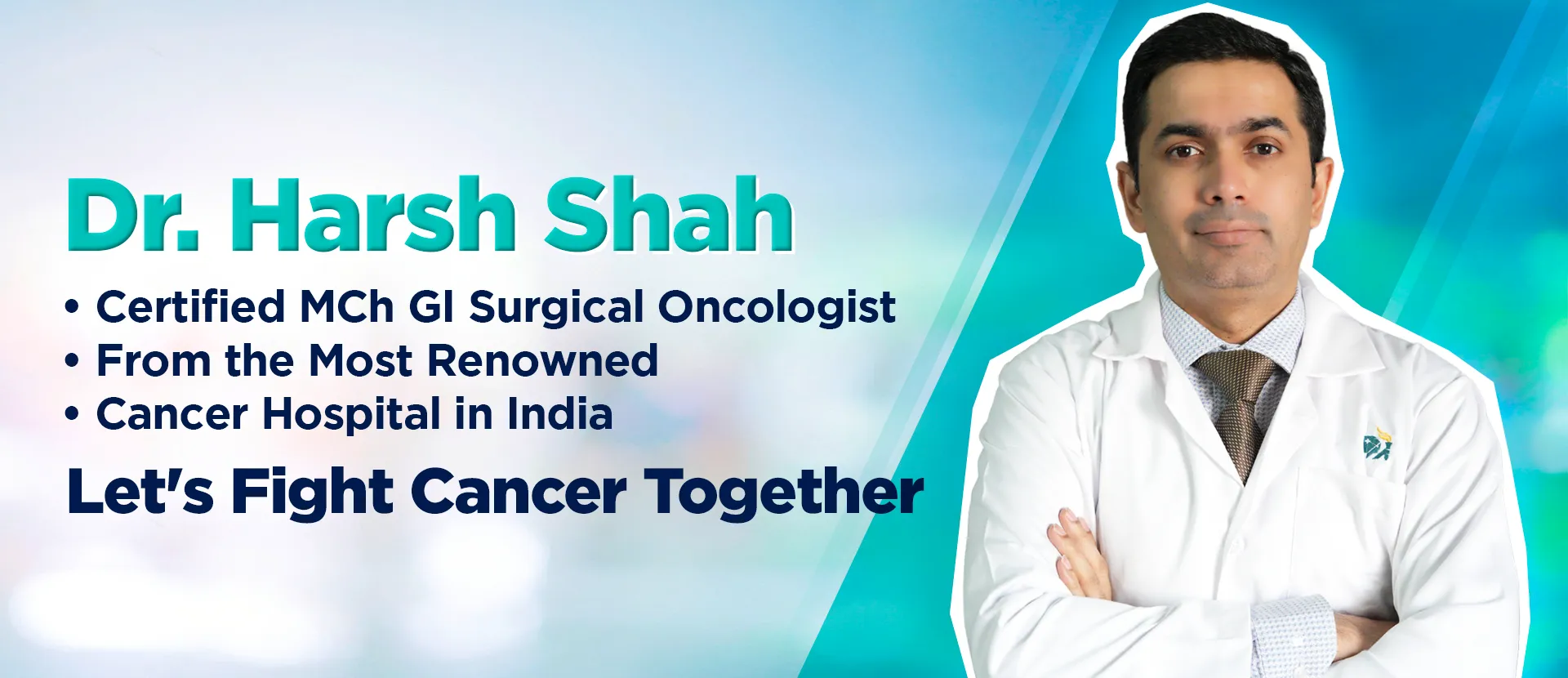


11750+ Patients have been successfully
treated

15+ years of work experience as a pancreatic cancer specialist

22+ Awards received by Dr. Shah for his achievements
In the meticulous management of pancreatic cancer, Dr. Harsh Shah employs advanced techniques that set the standard for pancreatic cancer treatment. At the best hospital for pancreatic cancer treatment in India, under Dr. Shah’s guidance, cutting-edge techniques are utilized for proper diagnosis and early treatment. Patients benefit from his commitment to staying abreast of the latest advancements, ensuring that the treatment offered is at the forefront of medical innovation. As the best pancreatic surgeon in India, Dr. Shah’s techniques reflect a dedication to providing the highest quality pancreatic cancer treatment.
Dr. Harsh Shah’s expertise in pancreatic cancer treatments at the best hospital for pancreatic cancer in India ensures top-notch pancreas cancer care. The advanced techniques cover pancreas tumor treatment and pancreatic cancer treatment in India, focusing on early detection and precision care. As the best pancreatic surgeon in India, Dr. Shah utilizes cutting-edge methods to minimize the cost of pancreatic cancer surgery in India, making pancreatic cancer treatment accessible for all patients.
Dr. Harsh Shah stands as an expert in the field of pancreatic cancer treatment, revolutionizing the landscape of care in India. Acknowledged as the best doctor for pancreatic cancer, his institution is renowned as the top choice for those seeking optimal pancreatic cancer treatment. Dr. Shah’s visionary leadership extends to addressing complex conditions like MCN, SPEN, IPMN, and neuroendocrine tumours, making him a sought-after expert in pancreatic cancer treatment.
With specialization in pancreatic cancer treatment stage 4, Dr. Shah’s facility offers comprehensive options tailored for each stage of pancreatic cancer treatment. Known as the best Whipple surgeon in India, his approach ensures optimal care for complex pancreatic cancer conditions. The pancreatic cancer treatment cost in India is managed to provide value, ensuring quality pancreatic cancer treatment without compromising standards.

Exocrine Pancreatic Cancer:
⦿ Description: This is the most common type, making up approximately 95% of all pancreatic cancer cases.
⦿ Location: It develops in the exocrine cells of the pancreas, which produce enzymes for digestion.
⦿ Common Form: The most prevalent form is pancreatic adenocarcinoma.
Endocrine Pancreatic Cancer:
⦿ Alternative Names: Also known as neuroendocrine tumors or islet cell tumors.
⦿ Origin: This type of pancreatic cancer starts in the endocrine cells of the pancreas.
⦿ Function: Endocrine cells produce hormones that regulate various bodily functions.
⦿ Prevalence: Relatively rare, comprising about 5% of pancreatic cancer cases.
⦿ Abdominal Pain
⦿ Jaundice (Yellowing of the Skin and Eyes)
⦿ Unexplained Weight Loss
⦿ Loss of Appetite
⦿ Nausea
⦿ Fatigue
⦿ Changes in Bowel Movements
⦿ Genetic mutations: Inherited or acquired mutations play a key role.
⦿ Age and gender: Risk increases with age; slightly higher in men.
⦿ Smoking: Major lifestyle factor linked to pancreatic cancer.
⦿ Chronic pancreatitis: Long-term inflammation elevates risk.
⦿ Diabetes: People with long-standing diabetes face higher susceptibility.
⦿ Family history: Increased risk if close relatives had pancreatic cancer.
⦿ Obesity: Obesity and excess body weight contribute to higher risk.
⦿ Dietary factors: High intake of red meat and processed meats may play a role.
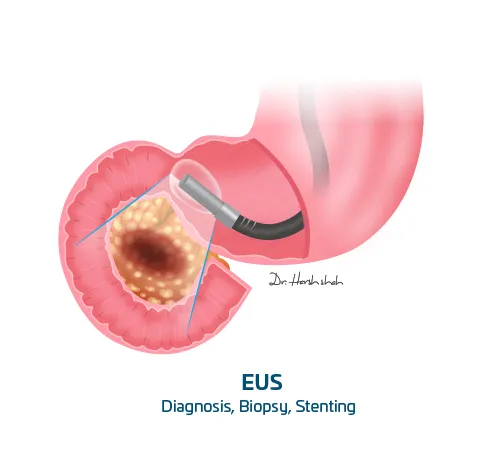
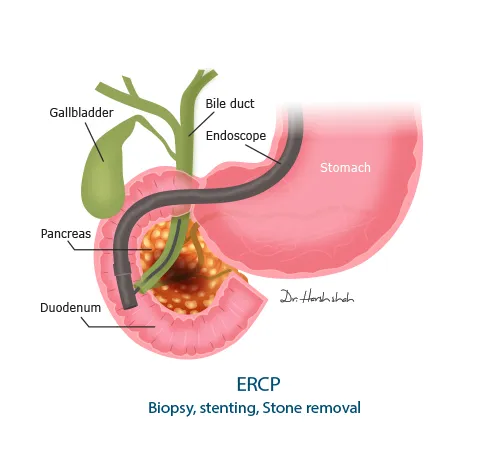
Pancreatic cancer is staged based on the extent of the disease. The stages of pancreatic cancer are as follows:
Stage 0: Also known as carcinoma in situ, cancer is confined to the top layers of cells in the pancreas and has not spread deeper.
Stage I: Cancer is localized to the pancreas and has not spread to nearby lymph nodes or distant sites.
Stage II: Cancer has spread to nearby lymph nodes but not to distant sites.
Stage III: Cancer has spread to major blood vessels near the pancreas or to nearby lymph nodes.
Stage IV: Cancer has spread to distant organs, such as the liver, lungs, or distant lymph nodes.
CT Scan: A CT scan, short for computed tomography scan, is a medical imaging technique that uses X-rays and computer processing to create detailed cross-sectional images of the body.
Dr. Harsh and his staff are amazing. I’m so glad I found them for my friend having pancreas cancer. he listened to me, I mean actually listened to me and heard me. He managed everything with perfection. We are happy and feel that one should come here if looking for best gastrointestinal & pancreatic cancer surgeon in Gujarat.

According to me, Dr. Harsh Shah is the best pancreatic cancer specialist in Ahmedabad. He has operated on my mother who was suffering from neuroendocrine tumor of pancreas. An operation called distal pancreatectomy of the pancreas was performed. Now my mother is fine and we are being discharged today. I would say we have been given the best treatment for pancreatic cancer. Thanks to all the hospital staff. I would highly recommend Dr. Harsh Shah for any pancreatic cancer treatment.

Dr. Harsh and his staff are amazing. I’m so glad I found them for my friend having pancreas cancer. he listened to me, I mean actually listened to me and heard me. He managed everything with perfection. We are happy and feel that one should come here if looking for best gastrointestinal & pancreatic cancer surgeon in Gujarat.

According to me, Dr. Harsh Shah is the best pancreatic cancer specialist in Ahmedabad. He has operated on my mother who was suffering from neuroendocrine tumor of pancreas. An operation called distal pancreatectomy of the pancreas was performed. Now my mother is fine and we are being discharged today. I would say we have been given the best treatment for pancreatic cancer. Thanks to all the hospital staff. I would highly recommend Dr. Harsh Shah for any pancreatic cancer treatment.


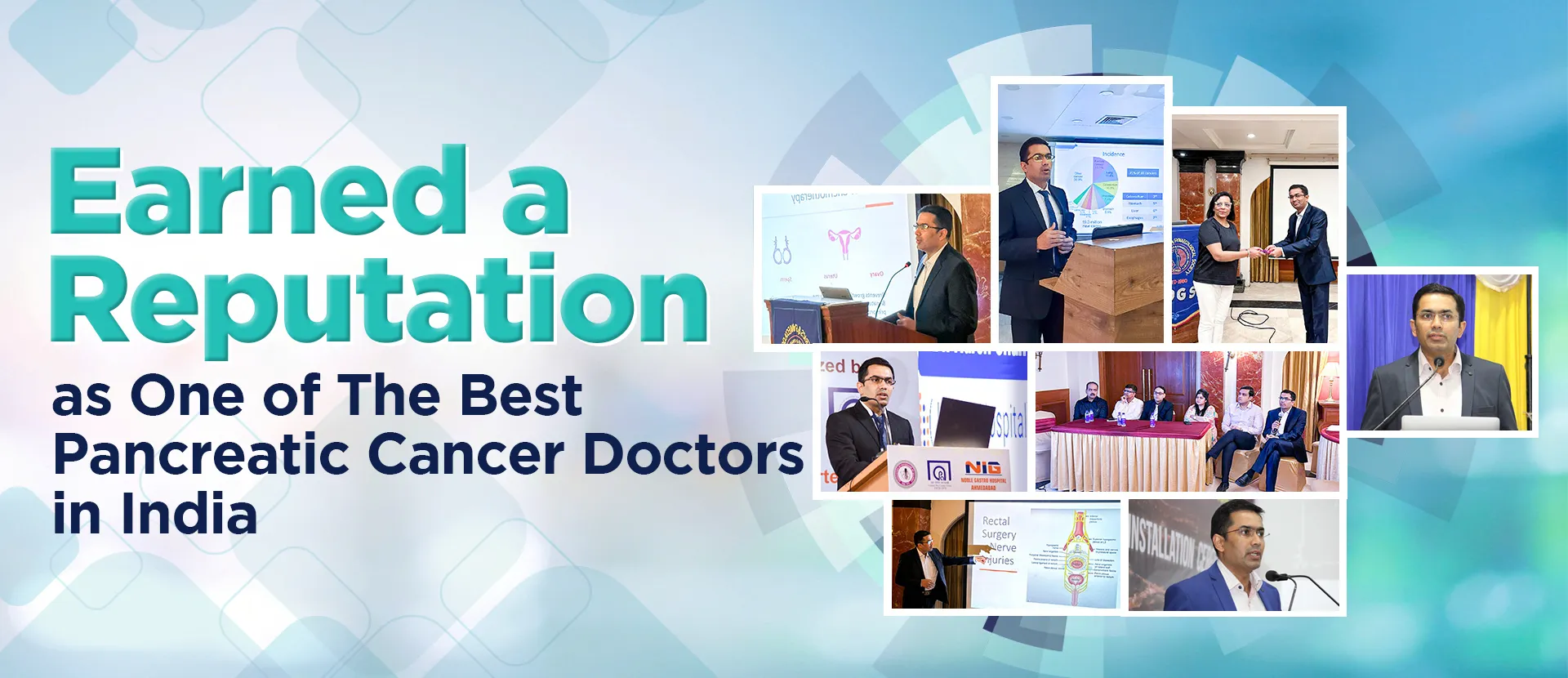
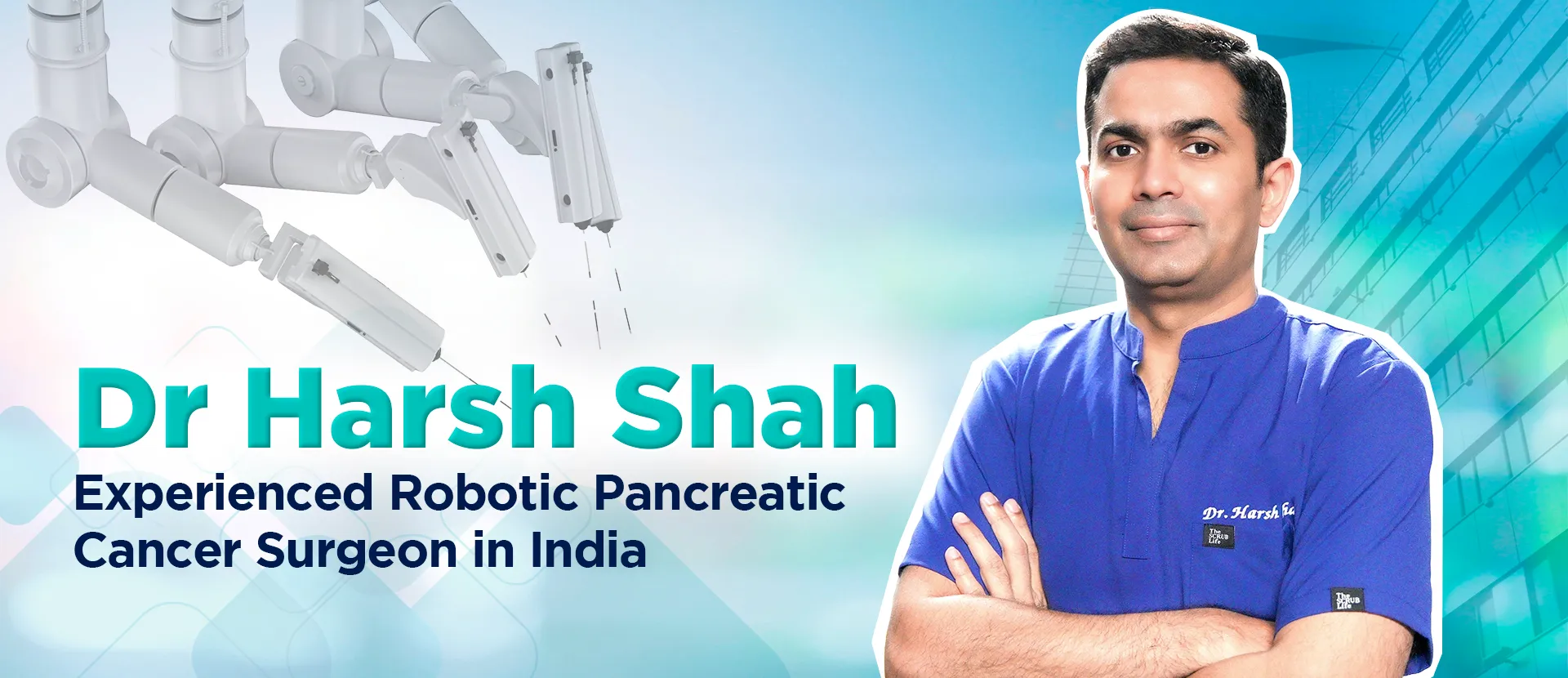
Dr. Harsh Shah leads the best team of experts at the forefront of pancreatic cancer treatment in India. With a collective focus on providing the best treatment for pancreatic cancer, the team combines their expertise to address complex conditions, including mucinous cystic neoplasm, IPMN & neuroendocrine tumours. He collaborates with a team of experts in his pancreatic cancer hospital in India, including medical oncologists, radiation oncologists, and interventional radiologists.
Operating from the best hospital for pancreatic cancer treatment in India, this team ensures a comprehensive approach to patient care in the center for pancreatic cancer treatment, where each member, from the best pancreatic surgeon to the pancreas cancer specialist in Ahmedabad, contributes to optimal outcomes. The commitment to excellence is evident in the patient-friendly approach, considering factors like pancreas operation cost for accessible and quality pancreatic cancer treatment.
Dr. Shah leads a dedicated team, including the best oncologist in Ahmedabad and top specialists in pancreas cancer treatment. The team excels in handling complex pancreatic cancer treatment in India, collaborating to offer the highest quality care. Surgical oncologists in Ahmedabad work closely with the team to manage cases efficiently, ensuring every patient benefits from a coordinated approach to pancreatic cancer treatment.
Dr. Harsh Shah’s more than 15+ years of experience instills a profound sense of knowledge and trust. Recognized as the best doctor for pancreatic cancer treatment, his extensive expertise becomes the cornerstone of the patient’s journey. The team under his guidance, including the best pancreas doctor in Ahmedabad and pancreas specialist doctors in India, is committed to upholding the highest standards of care in pancreatic cancer treatment.
Patients can rely on the knowledge and trustworthiness embedded in the institution, making it the go-to choice for pancreatic cancer treatment. In matters of pancreatic cancer, Dr. Shah’s leadership ensures that the management involves not only proper diagnosis and early treatment but also a foundation of unwavering trust in the expertise of the entire team dedicated to pancreatic cancer treatment.
Dr. Shah, recognized as the best oncologist in Gujarat, ensures trust and reliability in every step of pancreatic cancer treatment. Patients can rely on the expertise of an oncologist doctor in Ahmedabad who is committed to providing pancreas cancer care with transparency. The best pancreatic surgeon in India is supported by a team known for its consistent results and patient-first philosophy in providing the best pancreatic cancer treatment.
Explore surgical photographs with caution. Please be advised that viewer discretion is recommended.

Assisted by robotic systems to enhance precision in surgical procedures.

Less invasive procedures designed for quicker recovery.

Utilizes the immune system to combat pancreatic cancer.

Targets specific features of cancer cells for precise treatment.

Delivers focused radiation to the tumor, sparing healthy tissues.

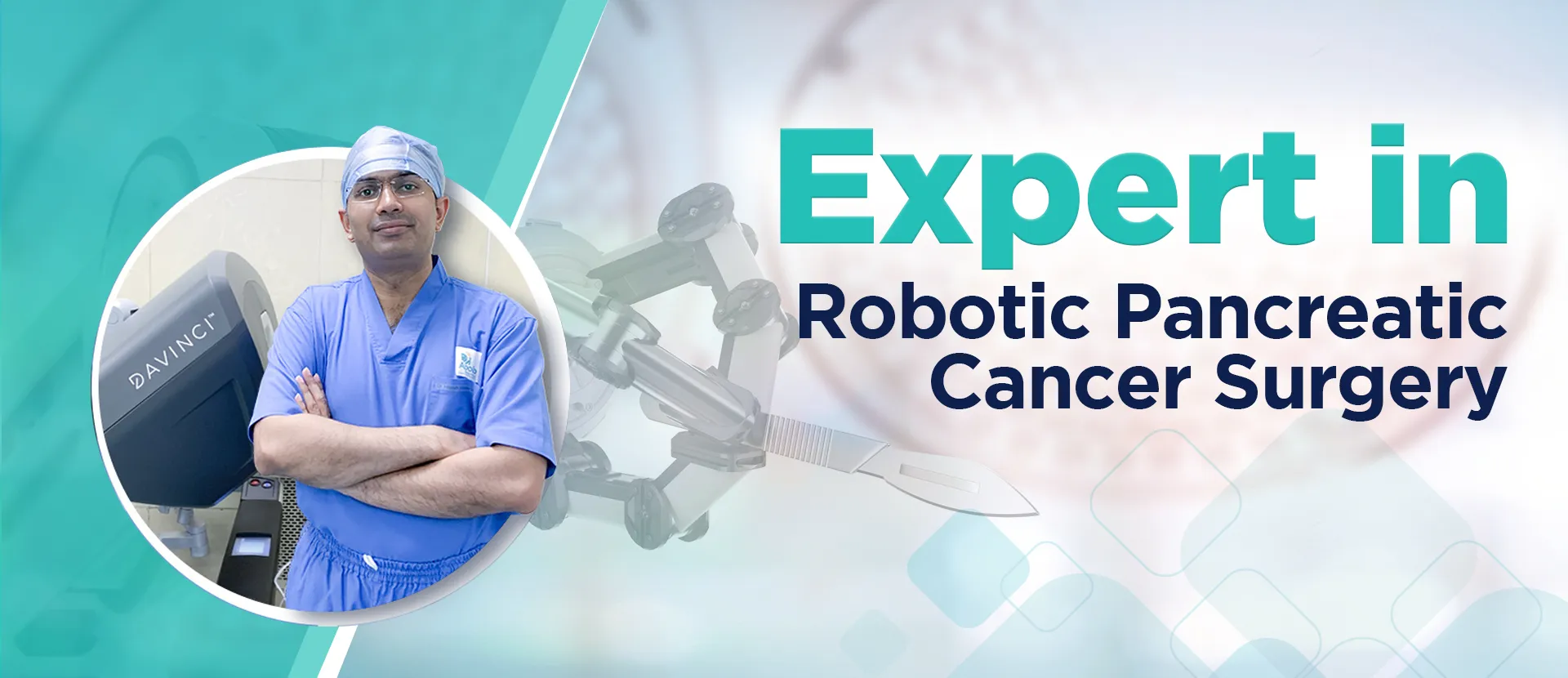
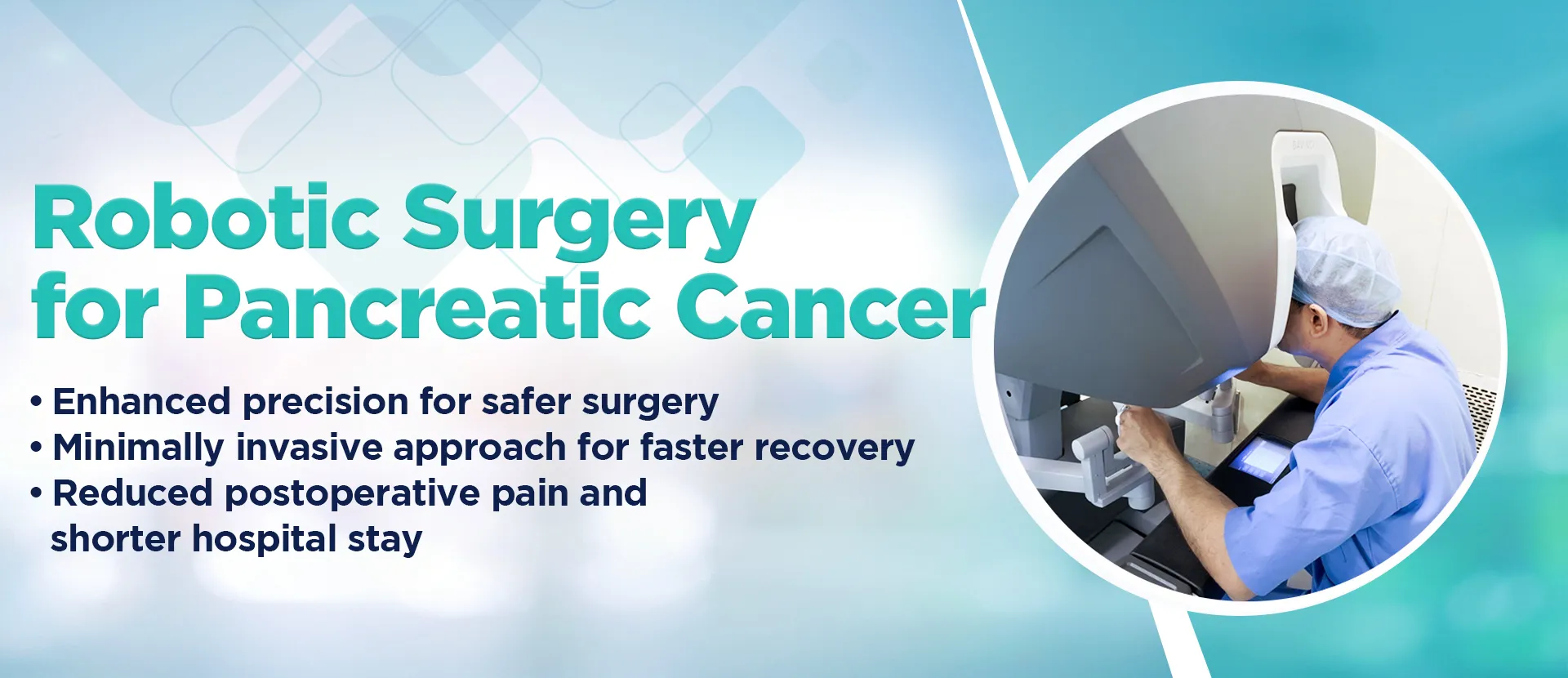
⦿ Distal Pancreatosplenectomy is a surgery that removes the left part of the pancreas and the spleen. It is usually done when pancreatic cancer is found in the body or tail of the pancreas. The goal of the procedure is to take out the tumor and any nearby affected tissue.
⦿ This surgery can be done using minimally invasive methods like laparoscopy or robotic-assisted surgery.
⦿ After the procedure, patients might need additional treatments such as chemotherapy or radiation therapy.

Chemotherapy Before Surgery Helps People With Pancreatic Cancer Live Longer You are here >> Home > Latest Updates > Pancreas Cancer Updates > Chemotherapy Before… A

Which Chemotherapy Works Better for Advanced Pancreatic Cancer? You are here >> Home > Latest Updates > Pancreas Cancer Updates > Which Chemotherapy… People with advanced

Chemo Before Surgery May Help With Pancreatic Cancer, But Doesn’t Extend Life You are here >> Home > Latest Updates > Pancreatic Cancer Updates >
Pancreatic cancer is diagnosed by a team of healthcare professionals, including Gastroenterologists, Radiologists and Pathologists. They analyze the patient’s symptoms, medical history, and perform various tests.
Pancreatic cancer is most curable when diagnosed at an early stage (typically stages 0 or I), before it has spread beyond the pancreas. However, even in later stages, treatment options are available to manage symptoms and extend survival.
Stage 4 pancreatic cancer is the most advanced stage, indicating that the cancer has spread to distant organs or tissues beyond the pancreas. Treatment at this stage focuses on palliative care to alleviate symptoms and improve the patient’s quality of life.
The first test to evaluate suspected pancreatic cancer is typically an imaging test, such as a computed tomography (CT) scan or an endoscopic ultrasound (EUS), which helps visualize the pancreas and detect any abnormalities.
The best scan to detect cancer depends on the type and location of the cancer. Different scans, such as CT scans, MRI scans, PET scans, and ultrasound, have their strengths and limitations. The choice is determined by the specific needs of the patient and the suspected type of cancer.
Both MRI (magnetic resonance imaging) and CT (computed tomography) scans are valuable for detecting and diagnosing cancer. The choice depends on factors like the type of cancer, location, and specific clinical requirements. In some cases, a combination of both scans may be used for a comprehensive evaluation.